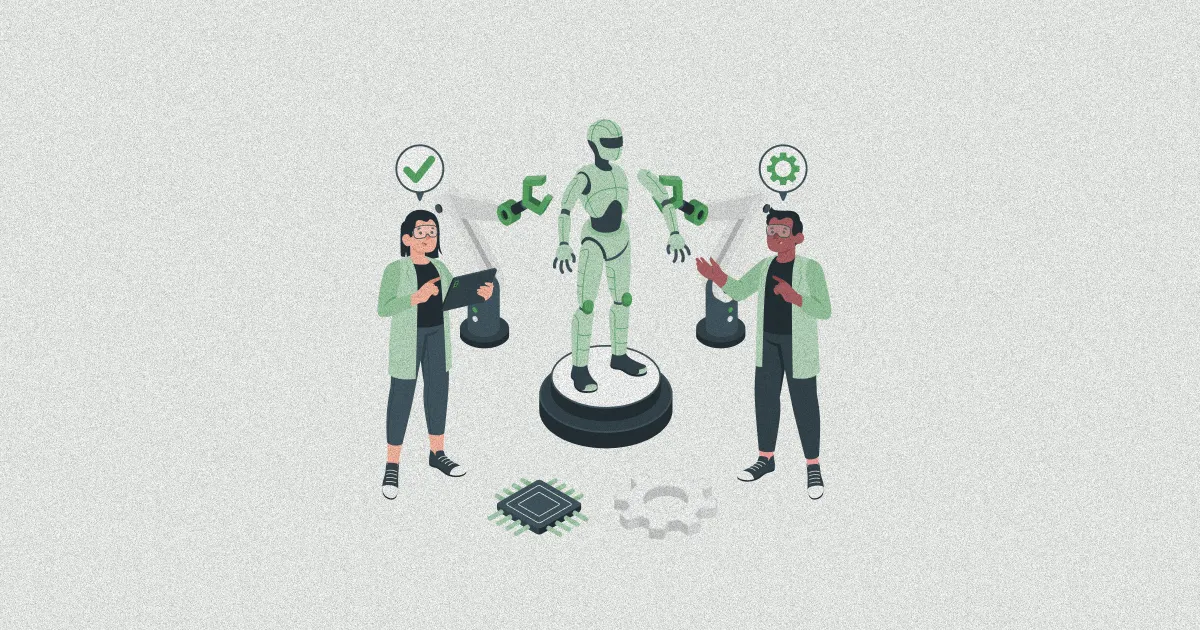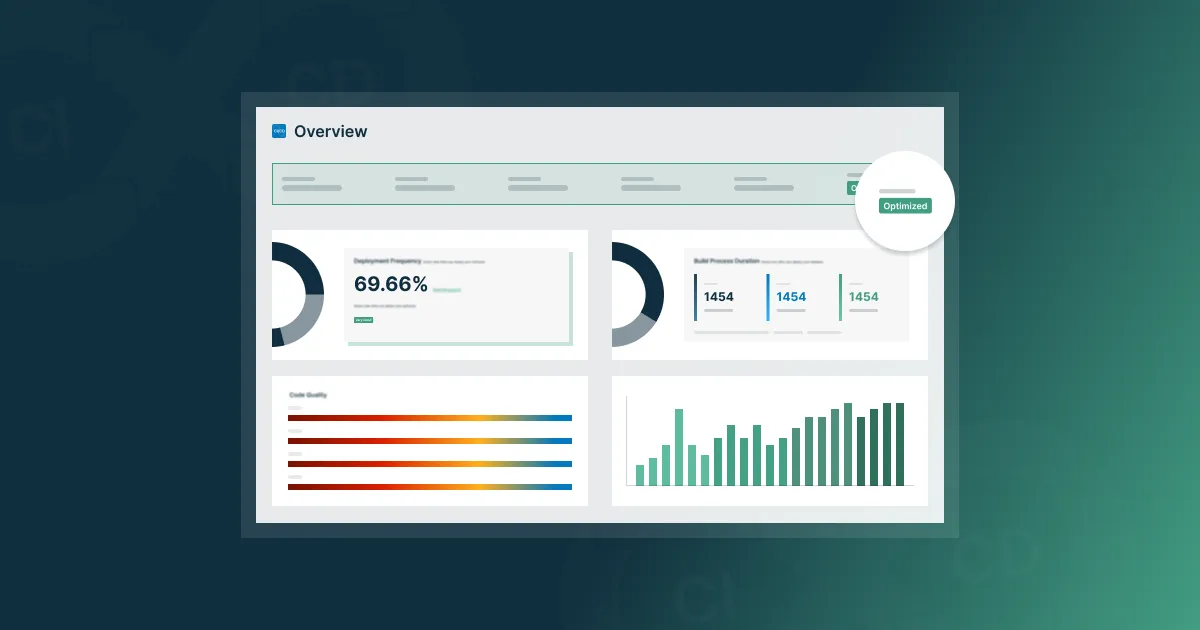A Practical Guide to Implementing AI Agent Workflows in DevOps

The adoption of artificial intelligence across engineering teams is accelerating, and DevOps is no exception. One of the most impactful applications is the rise of AI agent workflows, autonomous, interconnected task flows driven by intelligent agents capable of monitoring, decision-making, and executing actions based on real-time input and contextual data.
These workflows reduce operational overhead, improve response times, and help DevOps teams maintain performance and reliability as systems scale in complexity. This guide explains how AI agents function, how they contribute to DevOps practices, and how organizations can implement and expand AI agent workflows in a structured, measurable way.
AI Agents Explained
AI agents are autonomous software components that act based on predefined goals, contextual awareness, and learned patterns. Unlike rule-based scripts, these agents can operate in dynamic environments and evolve over time through data-driven insights.
Each agent is usually assigned a specific function, such as monitoring logs, validating deployments, analyzing system health, or responding to alerts. When multiple agents are connected sequentially to perform a larger operation, they form an AI agent workflow. These workflows enable proactive and reactive actions to take place without human intervention.
The result is a more responsive, scalable, and consistent approach to operational management.
AI in DevOps
Integrating AI in DevOps brings intelligence and autonomy into the continuous delivery lifecycle. AI agents can be embedded throughout the toolchain to enhance both development and operational activities.
Examples of AI use cases in DevOps include:
- Identifying performance degradation during canary deployments
- Detecting early indicators of infrastructure failure based on resource trends
- Classifying incidents automatically and routing them to the correct teams
- Recommending optimizations in test coverage or resource provisioning
These capabilities help DevOps teams respond faster, reduce time spent on manual analysis, and maintain higher reliability across environments.
Why AI Agent Workflows Are Becoming a Standard in Operational Automation
The complexity of modern infrastructure makes manual operations unsustainable at scale. Teams face constant pressure to increase velocity while minimizing downtime. AI agent workflows address this challenge by turning institutional knowledge into automated processes that execute consistently and improve over time.
Benefits of AI Agent Workflows
Implementing AI agent workflows brings a wide range of benefits across operational, engineering, and business functions:
1. Faster Incident Response
Agents can detect and respond to issues in seconds, significantly reducing mean time to resolution (MTTR). This minimizes the impact on end users and supports higher service availability.
2. Operational Consistency
Workflows enforce standardized procedures across environments. This reduces the variability introduced by manual interventions and ensures compliance with operational best practices.
3. Reduced Engineering Overhead
By offloading repetitive tasks to AI agents, teams can spend less time on firefighting and more time on strategic work, such as improving architecture or building new features.
4. Improved Scalability
As infrastructure grows, AI agents scale alongside it without requiring a proportional increase in human resources. This allows operations to keep pace with development velocity.
5. Proactive Issue Prevention
Many workflows are designed not just to respond to failures but to anticipate and prevent them, such as scaling services ahead of forecasted demand or flagging high-risk deployments early.
6. Better Observability and Reporting
AI agent workflows produce structured logs, metrics, and reports, making it easier to analyze patterns, track performance, and demonstrate auditability in compliance-driven environments.
7. Continuous Learning and Adaptation
Some AI agents incorporate machine learning, allowing workflows to evolve over time based on new data and feedback. This makes the system smarter and more accurate with each iteration.
These benefits position AI agent workflows not as a convenience but as a strategic investment for organizations looking to improve reliability, efficiency, and developer productivity.
Common Use Cases for AI Agent Workflows in Production Environments
AI agent workflows can be applied across a wide range of operational domains. Below are several real-world scenarios where they deliver tangible value:
Incident Detection and Resolution
When a service degrades, agents can correlate the issue with recent deployments, cross-reference known anomalies, initiate a rollback, and open a ticket, completing all tasks autonomously.
Security Automation
An agent monitoring login activity detects a suspicious pattern. It triggers identity verification, adjusts access permissions, flags the event for human review, and updates the audit log.
Resource Optimization
Agents evaluate current resource utilization patterns and proactively scale infrastructure components to maintain performance while controlling costs.
Continuous Delivery Governance
During a deployment, agents verify test results, validate configuration files, monitor deployment metrics, and halt the release if defined thresholds are exceeded.
Key Components of a Reliable AI Agent Workflow
Designing effective AI agent workflows requires thoughtful orchestration of agents and tooling. The following components are commonly involved:
- Trigger mechanism: Defines when a workflow begins (e.g., performance threshold crossed, deployment started)
- Processing agents: Evaluate data, perform analysis, and decide next steps
- Action agents: Execute changes such as scaling infrastructure, triggering alerts, or modifying configurations
- Audit and logging layer: Records all decisions and actions for review and compliance
- Feedback loop: Incorporates post-execution results to refine future decision-making
Maintaining modularity between these components allows for flexibility, faster iteration, and more robust systems.
How to Start Building AI Agent Workflows in Your Organization
Adopting this approach does not require an overhaul of your existing systems. Most teams start small and gradually extend the scope of automation.
Step 1: Identify Repeatable Operational Patterns
Begin by reviewing historical incidents, alerts, or maintenance activities that follow predictable patterns. Look for workflows that would benefit from automation, such as alert triaging or deployment validation.
Step 2: Select Suitable AI-Enabled Tools
Many platforms now support AI-driven automation and observability. These include infrastructure-as-code platforms, AIOps tools, and cloud-native monitoring systems. Choose tools that offer integration capabilities and agent orchestration features.
Step 3: Build a Minimal Viable Workflow
Start with a simple use case, such as an agent that tags incidents based on log patterns and opens corresponding tickets. Ensure it is well-documented, observable, and open to feedback from the team.
Step 4: Evaluate, Iterate, and Scale
Track workflow outcomes and measure improvements in incident response time or developer efficiency. Refine the logic, add new agents where appropriate, and gradually expand coverage to other parts of your DevOps toolchain.
Managing Risk and Oversight in AI Agent Workflows
While AI agents can handle operational tasks autonomously, appropriate safeguards and governance should be in place:
- Approval Gates: For sensitive operations like rollbacks or security interventions, configure workflows to require human approval before proceeding
- Audit Trails: Maintain clear logs of agent decisions and actions to support compliance and incident analysis
- Fallback Mechanisms: Ensure agents fail gracefully and alert teams when workflows cannot complete
Balancing automation with accountability is essential, particularly in regulated or mission-critical environments.
Future Outlook: AI Agent Workflows and Autonomous Operations
The adoption of AI agent workflows is expected to increase significantly as organizations pursue more autonomous and scalable operations. Future developments may include:
- Greater integration with natural language interfaces for workflow design
- More sophisticated reinforcement learning agents that optimize workflows over time
- Seamless orchestration between AI agents and human operators based on role and context
As systems grow more complex, the ability to define and execute intelligent workflows will become a competitive advantage for engineering teams aiming to deliver reliable services at scale.
Conclusion
AI agent workflows provide a scalable and intelligent approach to operational automation, aligning with the goals of modern DevOps practices. They transform how organizations detect, respond to, and learn from operational events by turning fragmented manual procedures into structured, repeatable, and intelligent workflows.
Combined with the growing role of AI in DevOps, these workflows help reduce latency in response, eliminate variability in decision-making, and improve the overall quality and reliability of services.
For organizations committed to operational excellence, adopting AI agent workflows is not only a technical improvement—it is a strategic shift toward more autonomous, efficient, and resilient systems.
Subscribe to receive the latest blog posts to your inbox every week.
*By subscribing you agree to with our Privacy Policy.

Relevant Posts



